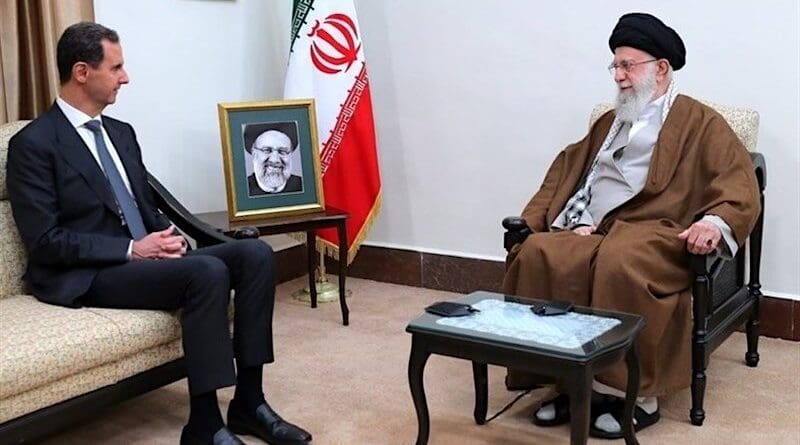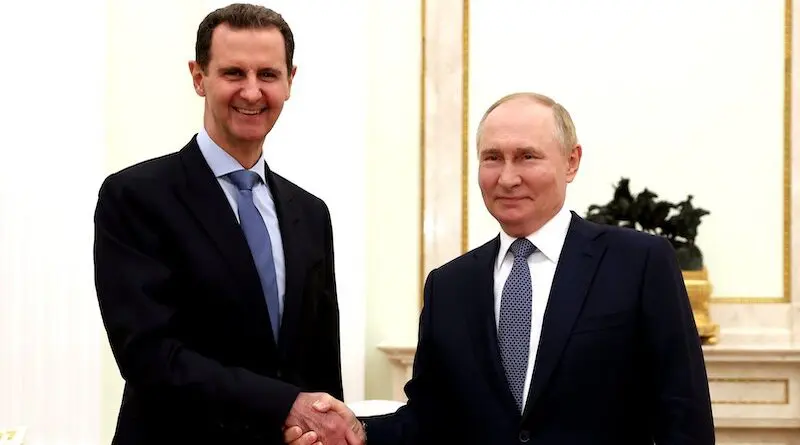Assad’s Fall Opens New Dynamics In Middle East – Analysis

File photo of Syria's Bashar al-Assad with Iran's Ayatollah Seyed Ali Khamenei. Photo Credit: Tasnim News Agency
By VOA
By Dale Gavlak
The overthrow of Syria’s Bashar al-Assad regime has opened the door to new dynamics in the Middle East, regional analysts say, with Turkey likely gaining superiority, Iran reeling and, with that, Iraq gaining more freedom from Iranian pressure.
The Assad government in Syria spanned 54 years in power — first with the elder Hafez al-Assad and later with son Bashar of the minority Alawite community, a branch of Shiite Islam. Regional analysts say its fall marks a seismic shift in Middle East politics.
Sinan Ulgen, a senior fellow with Carnegie Europe speaking during a Carnegie Middle East Center webinar on Dec. 19 in Beirut, called it a “political earthquake” with far-reaching regional implications.
“Fundamentally, we now see the emergence of a government in Syria that maybe after 50 years really is likely to be more pro-Turkey than pro-Iran,” Ulgen said. “This is a lasting change in the regional power constellation, which is another reason why the fall of Assad has been welcomed with such zeal in Ankara,” the capital of Turkey.
Ellie Geranmayeh, the deputy head of the Middle East program at the European Council on Foreign Relations, said Israel’s attacks on Iran’s assets in Syria and its Hezbollah proxies in neighboring Lebanon, as well as Israeli military strikes in the heart of the Iranian capital, Tehran, “present a moment of regional reckoning” for Iran.
”It [Iran] is definitely on the backfoot,” she said. “There is now a strategic rethink … happening in the establishment about where their policies — both at home and abroad — go from here.”
Geranmayeh said prominent figures in Iran’s powerful Revolutionary Guard Corps are likely to be replaced with others, given the nation’s demoted regional status and the near demise of its so-called axis of resistance in Syria, Lebanon, Iraq and Yemen.
She said that Iran likely will spin a narrative that the late Revolutionary Guard commander Qassem Soleimani’s regional project to surround Israel with a so-called ring of fire has been “accomplished,” and that Iran will look to devise other plans to deal with the new reality it faces.
Harith Hasan, a nonresident senior fellow at the Carnegie Middle East Center, said, “Iraq is the last stronghold for Iran’s axis of resistance,” but that, too, could be changing.
“So, Iran might try to strongly defend that influence,” Hasan said. “But as we see, the balance of power has shifted a lot, and the Iraqi government gained more freedom to be able to resist some of the pressure coming from Tehran.”
Hasan said concerns about a possible Islamist-led government in Syria is giving cause for concern to its neighbors, as well as to regional political influencers Saudi Arabia and the United Arab Emirates.
That, he said, “could give Iraq new leverage” because of its long border with Syria and strong cross-border ties between the two countries.
Hasan said that also may give Iraq a way out from under Iran’s influence, as developments in the region continue to un
Fall Of Syria Could Be Major Blow To Russia’s Strategy In Africa – Analysis

Syria's President Bashar al-Assad with Russia's President Vladimir Putin. Photo Credit: File photo Kremlin.ru
After years of propping up Syrian despot Bashar al-Assad with a combination of military and mercenary might, Russia ultimately could not protect him from a rebel offensive that quickly toppled the government in December.
While the downfall of Assad has worldwide geopolitical implications, it reverberated particularly strongly in Africa, where Russia is supporting military juntas and autocratic leaders.
“[It] is a strategic political defeat for Moscow and has thrown the Kremlin into a crisis,” the Institute for the Study of War wrote on December 8. “Russia’s inability or decision to not reinforce Assad’s regime as the Syrian opposition offensive made rapid gains throughout the country will also hurt Russia’s credibility as a reliable and effective security partner.”
Long convoys choked Syria’s roads as Russian troops and military assets retreated to their two main posts — Khmeimim air base and Tartus naval base. Warships, cargo vessels, fighter jets and transport planes scrambled back to Russia to avoid the chaos, as it became apparent that Russian President Vladimir Putin had backed the losing side in Syria’s long, bloody civil war.
“This will be humiliating for the Kremlin and potentially damaging, too,” Sky News correspondent Ivor Bennett said in a report from Moscow. “After doing so much to keep Assad in power over the past decade they’ve now lost a key strategic ally, which in turn could seriously harm Russia’s regional influence.”
The two main bases served as crucial logistical hubs between Africa and Russia. Experts say it is unclear whether Syria’s new leaders will allow Russian forces to retain them.
“Without a reliable air bridge, Russia’s ability to project power in Africa collapses,” Anas el-Gomati, director of the Libya-based Sadeq Institute, told Bloomberg. “Russia’s entire operational strategy in the Mediterranean and Africa is hanging by a thread.”
The Khmeimim air base was a key stop for military and cargo planes refueling on their way to Africa. According to Rybar, a well-known Russian military blogging channel on Telegram, cargo planes can only reach Libya directly from Russia if they are empty. Rybar said the Kremlin will need “alternative options,” including boosting its presence in Libya and Sudan.
John Foreman, a former British defense attache in Moscow, said that the loss of Russia’s bases in Syria would make it much more difficult to support the estimated 20,000 mercenaries based primarily in Burkina Faso, the Central African Republic, Libya, Mali and Niger.
“Their likely loss is a significant strategic setback for Russia on its southern flank,” he told British newspaper The Telegraph. “Russia lacks permanent bases generally, so both are important, and both had significant investment over the past seven years.”
With Assad now in exile in Moscow, many of Russia’s most important investments in the Middle East and Africa are in jeopardy. But the reputational damage could carry the most weight on the continent. When Assad fled his home just hours before Damascus was overrun on December 8, he and his family were the sole beneficiaries of the same “regime survival package” that Russia touts to military junta rulers in Africa.
Experts say Russia’s failure likely will stick in the minds of its partners in Sub-Saharan Africa.
“The ruling authorities in Mali, the Central African Republic and in other countries that depend on Russian security forces may begin to question whether Moscow has the capacity — or the will — to come to their aid in times of crisis,” Federico Manfredi Firmian, an associate research fellow at the Italian Institute for International Political Studies, told The Africa Report.
“The Kremlin’s preoccupation with Ukraine has already limited its ability to act elsewhere. Losing Syria further amplifies doubts about Russia’s ability to deliver on its promises, signaling to current and prospective partners that they might need to look elsewhere for support.”

Africa Defense Forum
The Africa Defense Forum (ADF) magazine is a security affairs journal that focuses on all issues affecting peace, stability, and good governance in Africa. ADF is published by the U.S. Africa Command.
No comments:
Post a Comment